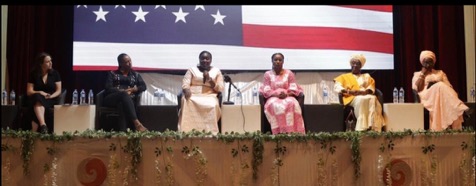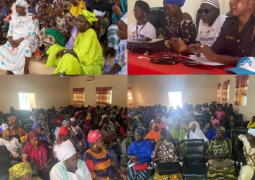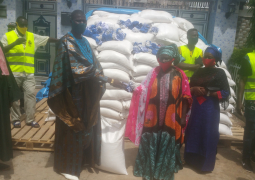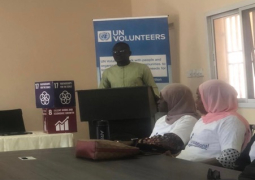
The event held at the Kairaba Beach Hotel, gathered over 100 women leaders representing various sectors including the diplomatic and consular corps, private and government and the media.
The confab, among others, seeks to discuss and find ways of tackling pertinent empowerment issues crucial to women’s leadership.
Welcoming the gathering, Susan Solomon, Public Affairs Officer at the US Embassy in Banjul, reminded that the Embassy attaches great importance to gender equality, saying they’re deeply committed to women's well-being, recognising that when women thrive, so do their families, communities and nations.
The Embassy, she added, has supported many Gambian women who are driving economic development.
“More than 53 percent of the business start-ups we assisted are woman-owned and they are thriving. Through USAID, we trained women shellfish harvesters to become stewards of fisheries and mangroves and women farmers were also helped through grants and the contributions of their Peace Corps volunteers.”
Looking into the future, Solomon noted that they are committed to educating young women and girls and that the United States Department of Agriculture is implementing the $28.5 million McGovern-Dole Food for Education program, focusing on childhood nutrition and literacy, particularly girls' education.
“U.S.-sponsored Competitive College Clubs (CCC) play a crucial role in helping rural girls pursue higher education opportunities.”
She revealed that recently they partnered with The Gambia Participates to train young people interested in running for public office, many of whom are women who are truly ready to run.
“It's also worth mentioning that the Millennium Challenge Corporation or MCC - Threshold Board in The Gambia is a model of inclusivity, primarily composed of female Gambians, including the Chair. And the MCC Compact will focus on transportation and education, with an emphasis on assisting women and girls.”
For her part, Mariama Darling Jallow, wife of the Vice President, who spoke on behalf of the First Lady of the Gambia, reminded that women still face significant disadvantages and barriers ranging from economic inequalities, limited access to education and gender-based violence persist as formidable challenges.
“The disadvantages women encounter are merely personal struggles and they reflect systematic issues while calling on action to invest in education and the need to protect women and girls from sexual and gender discrimination.”
Jallow bemoaned the under-representation of women in leadership positions in The Gambia and called on women to actively unite in their efforts to break barriers, celebrate achievements, and foster a world where every woman can thrive.
For her part, Sharon L. Cromer, US Ambassador to The Gambia, acknowledged that working women usually invest 90% of their earnings in their children and households, thus contributing to the success of families, communities and countries.
The US Diplomat underscored the role of gender equality in any nation’s development, acknowledging that closing gender employment gaps could boost global GDP by almost 20 percent.
She thus urged women present to make a personal commitment to advancing gender equality within their spheres of influence, positing that a gender-inclusive economy is a strong, more resilient one.




